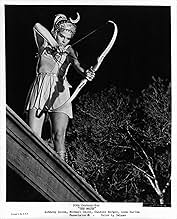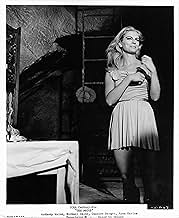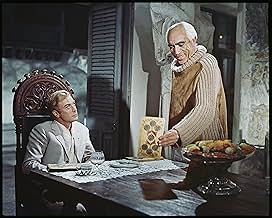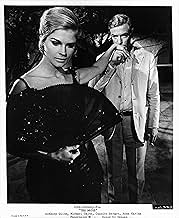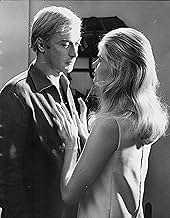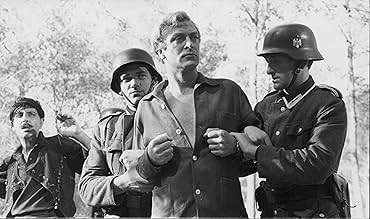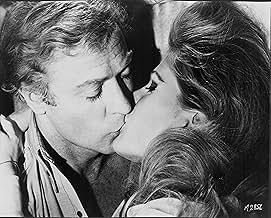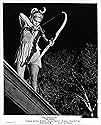IMDb-BEWERTUNG
5,6/10
1995
IHRE BEWERTUNG
Füge eine Handlung in deiner Sprache hinzuA teacher on a Greek island becomes involved in bizarre mind games with the island's magus (magician) and a beautiful young woman.A teacher on a Greek island becomes involved in bizarre mind games with the island's magus (magician) and a beautiful young woman.A teacher on a Greek island becomes involved in bizarre mind games with the island's magus (magician) and a beautiful young woman.
- Nominiert für 1 BAFTA Award
- 1 Nominierung insgesamt
Danièle Noël
- Soula
- (as Danielle Noel)
Andreas Malandrinos
- Goatherd
- (as Andreas Melandrinos)
Empfohlene Bewertungen
I loved the gorgeous Greek scenery but the story, which is not something you can follow anyway, was even harder to follow in the movie. I cannot imagine how anyone watching the movie can get any kind of grip on it if they have not read the book, and then, like me, they would probably wonder why Australian Allison turned into French Anne, and many other seemingly pointless changes in the story. The mysteries in the book seemed to be chopped up or left out in the movie. I saw it when it first came out and had the same problems with it then, since I had read the book several times. I recently watched it with my granddaughter (very intelligent at 20 and usually into movies I like) who was mostly amazed at how young Michael Caine and Candace Bergen were in it, but otherwise could not imagine why one would watch it except for the scenery.
Fowles' first novel became the darling of the emerging counterculture of the 60s. It fit a handy niche of layered narratives, connected in ways that emulated the emergence of "secret" cosmologies. By itself, it created a little stir because of the way it was folded by a certain kabbalistic technique while including reference to that technique.
The history of this makes it essential viewing. Its Fowles' first novel, partially autobiographical, taking over a decade to write. Its grand, risky, sloppy. It is perfect in its way, being as confusing in how it is written as the narrator within is. Its a happy accident that its deficiencies increase the effect.
The screenplay is quite a bit more incompetent and at the same time leaving out most of the ambiguities in the story. So the film is a disaster. Fowles would later straighten up the narrative in the novel and issue what in the film world would be a "director's cut" which tries to keep the ambiguities in the story but reduce them in the narration. Its far less effective than the original.
So why should you see this? Because it is a historical document that changed things significantly. Its based on two sources: one was a then little-known set of Kabbalistic lessons on Tarot ambiguities. The other is a piece of literary theory from the thirties: "Seven Types of Ambiguity." (Don't search it out: it is far less interesting than the title implies.)
Fowles simply conflated his own life (and remorse over handling a romance) into these two notions, deliberately trying to capture the seven types which incidentally inform my study of narrative folding.
In September of 1966 while in Spain for the filming of "How I Won the War," John Lennon, who hardly read anything, read this (twice, once heavily rugged) and it changed his life, the direction of The Beatles and hence enfranchised a new form of narrative. (He called and later visited Fowles while this script was in development. There is no artifact of that in the script.)
Its not Joyce, but it is the child of what he envisioned, dumbed down, but still raising the bar for narrative structure and affecting I assert nearly everything.
Ted's Evaluation -- 3 of 3: Worth watching.
The history of this makes it essential viewing. Its Fowles' first novel, partially autobiographical, taking over a decade to write. Its grand, risky, sloppy. It is perfect in its way, being as confusing in how it is written as the narrator within is. Its a happy accident that its deficiencies increase the effect.
The screenplay is quite a bit more incompetent and at the same time leaving out most of the ambiguities in the story. So the film is a disaster. Fowles would later straighten up the narrative in the novel and issue what in the film world would be a "director's cut" which tries to keep the ambiguities in the story but reduce them in the narration. Its far less effective than the original.
So why should you see this? Because it is a historical document that changed things significantly. Its based on two sources: one was a then little-known set of Kabbalistic lessons on Tarot ambiguities. The other is a piece of literary theory from the thirties: "Seven Types of Ambiguity." (Don't search it out: it is far less interesting than the title implies.)
Fowles simply conflated his own life (and remorse over handling a romance) into these two notions, deliberately trying to capture the seven types which incidentally inform my study of narrative folding.
In September of 1966 while in Spain for the filming of "How I Won the War," John Lennon, who hardly read anything, read this (twice, once heavily rugged) and it changed his life, the direction of The Beatles and hence enfranchised a new form of narrative. (He called and later visited Fowles while this script was in development. There is no artifact of that in the script.)
Its not Joyce, but it is the child of what he envisioned, dumbed down, but still raising the bar for narrative structure and affecting I assert nearly everything.
Ted's Evaluation -- 3 of 3: Worth watching.
I saw The Magus in 1968 in Tokyo, Japan where I was stationed in the Air Force. I was with four other airmen who were bored looking for something to do in one of the world's largest cities.
One of the guys in our group had apparently read the book and suggested we go see it. "It will be a wild ride!", he said. By the time we walked out of the cinema we were,
1. In love with Candice Bergen.
2. Totally confused what point the movie was trying to convey.
The guy who had read the book? "I, uh, didn't really understand the book either. I was kinda hoping the movie would clear up my confusion."
It failed.
One of the guys in our group had apparently read the book and suggested we go see it. "It will be a wild ride!", he said. By the time we walked out of the cinema we were,
1. In love with Candice Bergen.
2. Totally confused what point the movie was trying to convey.
The guy who had read the book? "I, uh, didn't really understand the book either. I was kinda hoping the movie would clear up my confusion."
It failed.
This film came out when I was a senior in college, and I loved it at the time. I thought it was really innovative and thought-provoking. It was also my first introduction to Eliot's famous fragment, which remains a particular favorite. It may be a difference in perceptions that is the root of the film vs book controversy because personally I can't stand Fowler as an author. I think he's extremely pretentious, not to mention boring. But that's just me. Other's like the book and hate the film because of their own perceptions. See the film and judge for yourself. I think it's definitely worth it.
As other commentators I didn't quite know whether to expect the worst movie ever or an undiscovered pearl. Well, it is neither. For lovers of the novel, I feel the film is quite adequate and interesting. Hard to imagine how the film impressions someone who hasn't read the book. In my mind this could have been an excellent film, but for two aspects: the score is awful (especially in the mountain climbing sequence with Anne); the final "trial" is totally botched, filmed as a dream-sequence instead of reality, as it should be, and featuring a ridiculous robot. I wish I could do a re-make.
Wusstest du schon
- WissenswertesSir Michael Caine lists this, along with Der tödliche Schwarm (1978) and Ashanti (1979), as one of the worst movies he ever made. This is mainly down to the fact that no one, least of all the audience, knew what it was about.
- PatzerIn the rented room where the English professor will live while continuing the teaching work of his predecessor in the so-called Greek island, there is a rather conspicuous historical XIX century Spanish painting by José Casado del Alisal which represents the first defeat of Napoleon's armies in Spain, in the city of Bailén, where Marechal Philippe Antoine Dupont de l'Estang surrendered to inexperienced Spanish General Castaños on 19 July 1808. Not quite a Hellenic topic, really.
- Zitate
Maurice Conchis: All men feel the need to risk death at least once in their life. War is a very unscientific answer to that need.
- VerbindungenFeatured in Denúncia Vazia (1979)
Top-Auswahl
Melde dich zum Bewerten an und greife auf die Watchlist für personalisierte Empfehlungen zu.
- How long is The Magus?Powered by Alexa
Details
- Laufzeit
- 1 Std. 57 Min.(117 min)
- Farbe
- Seitenverhältnis
- 2.35 : 1
Zu dieser Seite beitragen
Bearbeitung vorschlagen oder fehlenden Inhalt hinzufügen

